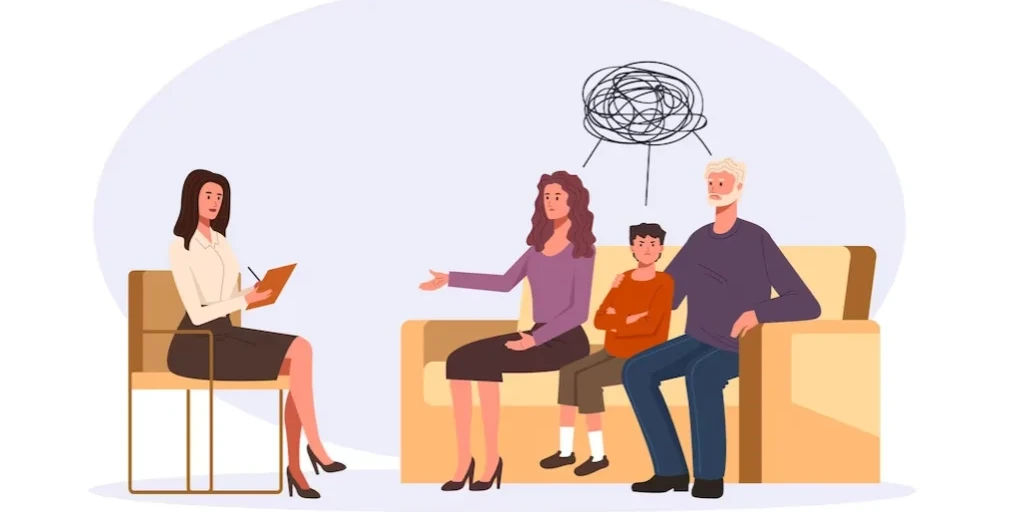24/7 Helpline:
(866) 899-221924/7 Helpline:
(866) 899-2219
Learn more about Dual Diagnosis Rehab centers in Wyoming
Dual Diagnosis Rehab in Other Cities

Other Insurance Options

Horizon Healthcare Service

PHCS Network

Sliding scale payment assistance

UnitedHealth Group

Ambetter

Cigna

ComPsych

Multiplan

Aetna

Amerigroup

UMR

CareSource

Providence

CareFirst

Health Choice

Optum

Optima

Choice Care Network

Absolute Total Care

Private insurance

Northern Wyoming Mental Health Center
Northern Wyoming Mental Health Center provides Outpatient Services in Sheridan, Ranchester and Dayto...

Campbell County Memorial Hospital – Behavioral Health
The Campbell County Memorial Hospital (CCMH) Behavioral Health center in Gillette, Wyoming provides ...

Cloud Peak Counseling Center
Cloud Peak Counseling Center is located in Worland, Wyoming. Cloud Peak Counseling Center provides o...

Southwest Counseling Service – College Drive
Southwest Counseling Service - College Drive is a comprehensive community mental health and substanc...

Peak Wellness Center – Laramie County Center – Adult
Peak Wellness Center – Laramie County Center – Adult is a private rehab located in Cheyenne, Wyoming...

Recover Wyoming
Recover Wyoming stands as a reputable substance abuse treatment center in Cheyenne, Wyoming for indi...

Yellowstone Behavioral Health Center
The Yellowstone Behavioral Health Center (YBHC) is a CARF-accredited behavioral health treatment cen...

Youth Emergency Services
Youth Emergency Services is a private rehab located in Gillette, Wyoming. Youth Emergency Services s...

Frontier Psychological Associates
Frontier Psychological Associates is a private rehab located in Evanston, Wyoming. Frontier Psycholo...

Shoshone Tribal Health Department – Recovery
Shoshone Tribal Health Department – Recovery is a public rehab located in Fort Washakie, Wyoming. Sh...

Volunteers of America Northern Rockies – The Gathering Place
Volunteers of America Northern Rockies - The Gathering Place is a residential treatment center that ...

Jackson Hole Community – Counseling Center
Jackson Hole Community – Counseling Center is a private rehab located in Jackson, Wyoming. Jackson H...

Northern Wyoming Mental Health Center – Crook County – Outpatient Office
Northern Wyoming Mental Health Center – Crook County – Outpatient Office is a private rehab located ...

Northern Wyoming Mental Health Center – Weston County – Outpatient
Northern Wyoming Mental Health Center – Weston County – Outpatient is a private rehab located in New...

Pioneer Counseling Services
Pioneer Counseling Services is a private rehab located in Evanston, Wyoming. Pioneer Counseling Serv...

High Country Behavioral Health
High Country Behavioral Health provides mental health and substance abuse services including treatme...

West Park Behavioral Health
West Park Behavioral Health (WPBH) is one of the Big Horn Basin Region's most comprehensive treatmen...

Northern Wyoming Mental Health Center – Psychosocial Rehabilitation Program & Psychiatric Services
Northern Wyoming Mental Health Center – Psychosocial Rehabilitation Program & Psychiatric Services i...

Carbon County Counseling Center
Carbon County Counseling Center is a drug and alcohol addiction treatment rehab in Rawlins, WY. Thei...

Clinic for Mental Health and Wellness
Clinic for Mental Health and Wellness in Laramie, Wyoming is a comprehensive behavioral health cente...

Ivinson Memorial Hospital – Behavioral Health
Ivinson Memorial Hospital – Behavioral Health is a private rehab located in Laramie, Wyoming. Ivinso...

Solutions For Life
Solutions For Life provides mental health and substance abuse services to Converse and Niobrara Coun...

Wyoming Recovery
Wyoming Recovery in Casper, Wyoming stands as a reputable addiction treatment center for individuals...

High Country Behavioral Health
High Country Behavioral Health (HCBH) is a dual-diagnosis addiction treatment center in Evanston, WY...

Fremont Counseling Service
Fremont Counseling Service (FCS) is a CARF accredited, non-profit community mental health center tha...

Southwest Counseling – Men’s Therapy
Southwest Counseling – Men’s Therapy is a public rehab located in Rock Springs, Wyoming. Southwest C...

High Country Behavioral Health
High Country Behavioral Health provides mental health and substance abuse services including treatme...

Central Wyoming Counseling
Central Wyoming Counseling (CWC) is a reputable dual-diagnosis substance abuse treatment center in C...

High Country Behavioral Health
High Country Behavioral Health provides mental health and substance abuse services including treatme...

Yellowstone Behavioral Health Center
The Yellowstone Behavioral Health Center provides outpatient mental health services based on income....

Curran Seeley Foundation
Curran Seeley Foundation is a private, non-profit organization providing comprehensive alcohol and d...

Southwest Counseling Service
Southwest Counseling Service – Recovery Center is an alcohol and drug addiction treatment center loc...

Cheyenne Regional Medical Center – Behavioral Health
Cheyenne Regional Medical Center offers treatment for behavioral issues in a supportive and effectiv...

Yellowstone Behavioral Health Center – HOPE House
Yellowstone Behavioral Health Center - HOPE House provides outpatient mental health services based o...

Volunteers of America Northern Rockies – Center of Hope
Volunteers of America Northern Rockies - Center of Hope is located in Riverton, Wyoming. Volunteers ...

Fremont Counseling Service
Fremont Counseling Service (FCS) is a CARF accredited, non-profit community mental health center tha...

Beartooth Men’s Rehab
Beartooth Men’s Rehab, in Powell, Wyoming, is a faith-based, long-term residential drug and alcohol ...

Second Chance Ministries
Second Chance Ministries aims to help men and women released from incarceration into Campbell County...

Transitions Family Counseling and Mediation Center
Transitions Family Counseling and Mediation Center is a private rehab located in Casper, Wyoming. Tr...
















































































































































































































































































































































































































































ABC Mental Health Substance Abuse Services
ABC Mental Health Substance Abuse Services is a private rehab located in Rock Springs, Wyoming. ABC ...

Bicycle Health – Wyoming
Bicycle Health - Wyoming is an online Medication Assisted Treatment Program. Bicycle Health - Wyomin...

Big Horn Basin Counseling Services
Big Horn Basin Counseling Services is located in Basin, Wyoming. Big Horn Basin Counseling Services ...

Volunteers of America Northern Rockies – The Life House
Volunteers of America (VOA) Northern Rockies offers their The Life House program that provides subst...

Solutions For Life
Solutions For Life provides mental health and substance abuse services to Converse and Niobrara Coun...

Lifeplan Safe Place Programs
Lifeplan Safe Place Programs is a private rehab located in Cheyenne, Wyoming. Lifeplan Safe Place Pr...

Peak Wellness Center – Laramie County Psychiatric Services – Adults
Peak Wellness Center – Laramie County Psychiatric Services – Adults is a private rehab located in Ch...

Day Reporting Center
Day Reporting Center is a private rehab located in Casper, Wyoming. Day Reporting Center specializes...

Cornerstone Behavioral Health
Cornerstone Behavioral Health is a private rehab located in Evanston, Wyoming. Cornerstone Behaviora...

WellSpring Counseling
Wellspring Counseling is a non-profit organization striving to provide high quality mental health an...

Peak Wellness Center
Peak Wellness is a private, non-profit counseling center offering high quality, affordable counselin...

Ezdan Fluckiger
Ezdan Fluckiger is a private rehab located in Torrington, Wyoming. Ezdan Fluckiger specializes in th...

12 – 24 Club
12-24 Club is a community resource for groups and individuals seeking for recovery with an attitude ...

Client Assistance Program
Client Assistance Program is a private rehab located in Cheyenne, Wyoming. Client Assistance Program...

Southwest Counseling – Women and Children
Southwest Counseling - Women and Children is a public rehab located in Rock Springs, WY. Southwest C...

WestCare – Wyoming Honor Conservation Camp/ Boot Camp (WHCC/BC)
WestCare – Wyoming Honor Conservation Camp/ Boot Camp (WHCC/BC) is a non-profit rehab located in New...

The Woman’s Heart
The Woman’s Heart is a private rehab located in Casper, Wyoming. The Woman’s Heart specializes in th...

Sunrise Resources Center
Sunrise Resources Center is a private rehab located in Casper, Wyoming. Sunrise Resources Center spe...

CoreCivic – Cheyenne Transitional Center
CoreCivic - Cheyenne Transitional Center is a 126-bed residential adult co-ed halfway house. CoreCiv...

Reflections
Reflections is a private rehab located in Casper, Wyoming. Reflections specializes in the treatment ...

Northern Wyoming Mental Health Center – Johnson County – Outpatient Office
Northern Wyoming Mental Health Center – Johnson County – Outpatient Office is a private rehab locate...

Big Horn Basin Counseling Services
Big Horn Basin Counseling Services is located in Lovell, Wyoming. Big Horn Basin Counseling Services...

Southwest Counseling – Recovery Center
Southwest Counseling – Recovery Center is a public rehab located in Rock Springs, Wyoming. Southwest...

180 Degree Difference
180 Degree Difference is a private rehab located in Cody, Wyoming. 180 Degree Difference specializes...

180 Degree Difference
180 Degree Difference is a private rehab located in Powell, Wyoming. 180 Degree Difference specializ...

Pathfinder
Cheyenne Community Drug Abuse Treatment Council, Inc. (Pathfider) is a private non-profit drug abuse...

Big Horn Mountain Recovery Center – Residential Home
Big Horn Mountain Recovery Center – Residential Home is a private rehab located in Sheridan, Wyoming...

Southwest Counseling – Women’s Treatment
Southwest Counseling Service - Women’s Addiction Program is a traditional rehab located in Rock Spri...

Apex Substance Abuse Counseling
Apex Substance Abuse Counseling is a private rehab located in Jackson, Wyoming. Apex Substance Abuse...

Yellowstone Recovery
Yellowstone Recovery Center offers an intimate serene treatment setting. Yellowstone Recovery Center...

Peak Wellness Center – Haven
Peak Wellness Center – Haven is a public rehab located in Cheyenne, Wyoming. Peak Wellness Center – ...

Barrett Counseling
Barrett Counseling is a private rehab located in Douglas, Wyoming. Barrett Counseling specializes in...

Family Dynamics Counseling
Family Dynamics Counseling is a private rehab located in Rock Springs, Wyoming. Family Dynamics Coun...

LS Counseling
LS Counseling is a private rehab located in Rawlins, Wyoming. LS Counseling specializes in the treat...

Foundations Counseling and Consulting of Wyoming
Foundations Counseling and Consulting of Wyoming offers outpatient treatment for individuals with al...

Lander Regional Hospital – Behavioral Health
Lander Regional Hospital – Behavioral Health is a private rehab located in Lander, Wyoming. Lander R...

Peak Wellness Center
Peak Wellness is a private, non-profit counseling center offering high quality, affordable counselin...

Solutions For Life
Solutions For Life provides mental health and substance abuse services to Converse and Niobrara Coun...

Yellowstone Behavioral Health Center – Wallace H. Johnson Group Home
Yellowstone Behavioral Health Center - Wallace H. Johnson Group Home is a regional transitional grou...

Life Quest
Life Quest is a private rehab located in Sheridan, Wyoming. Life Quest specializes in the treatment ...

Peak Wellness Center – Transitions and Alcohol Receiving Center
Peak Wellness Center – Transitions and Alcohol Receiving Center is a private rehab located in Cheyen...

Mountains Edge Counseling
Mountains Edge Counseling is a private counseling clinic located in Sheridan, WY. Mountains Edge Cou...

AA – Alcoholics Anonymous
AA – Alcoholics Anonymous is a non-profit rehab located in Pinedale, Wyoming. AA – Alcoholics Anonym...

Southwest Counseling Service – Bridges Program
Southwest Counseling Service - Bridges Program is a comprehensive community mental health and substa...

Gateway Counseling Center
Gateway Counseling Center is a private rehab located in Cody, Wyoming. Gateway Counseling Center spe...

Shoshone and Arapaho Tribal Substance Abuse Court
Shoshone and Arapaho Tribal Substance Abuse Court assists participants in breaking the cycle of subs...

Wyoming Behavioral Institute
Wyoming Behavioral Institute is a drug and alcohol rehab located in Casper, Wyoming. They provide me...

Trinity Teen Solutions
Trinity Teens Solution is a faith based mental health and substance abuse rehabilitation facility in...

Teton Youth and Family Services – Residential
Teton Youth and Family Services – Residential is a private rehab located in Wilson, Wyoming. Teton Y...

New Horizons
New Horizons is a private rehab located in Casper, Wyoming. New Horizons specializes in the treatmen...

Stepping Stones Counseling
Stepping Stones Counseling is a private rehab located in Casper, Wyoming. Stepping Stones Counseling...

Big Horn Mountain Recovery Center
Big Horn Mountain Recovery Center is a private rehab located in Sheridan, Wyoming. Big Horn Mountain...

Dewey Skansberg and Associates
Dewey Skansberg and Associates is a private rehab located in Casper, Wyoming. Dewey Skansberg and As...

Alcohol and Drug Treatment Services
Alcohol and Drug Treatment Services is a private rehab located in Casper, Wyoming. Alcohol and Drug ...

Southwest Counseling Service
Southwest Counseling Service is a comprehensive community mental health center that has been providi...

Piedmont Psychological Practice
Piedmont Psychological Practice is a private, professional group clinic that offers behavioral healt...

Solutions For Life – Solutions House
Solutions For Life - Solutions House provides mental health and substance abuse services to Converse...

Personal Frontiers
Personal Frontiers Inc is located in Gillette, Wyoming. Personal Frontiers Inc provides substance us...

Peak Wellness Center
Peak Wellness is a private, non-profit counseling center offering high quality, affordable counselin...

Peak Wellness
Peak Wellness is a private, non-profit counseling center offering high quality, affordable counselin...

Volunteers of America Northern Rockies – Booth Hall
Located in Gillette, Wyoming, Volunteers of America Rockies- Booth Hall offers alcohol and drug reha...

AA – Alcoholics Anonymous – East Garfield Street
AA – Alcoholics Anonymous – East Garfield Street is a non-profit rehab located in Laramie, Wyoming. ...

AA – Alcoholics Anonymous
AA – Alcoholics Anonymous is a non-profit rehab located in Cheyenne, Wyoming. AA – Alcoholics Anonym...

AA – Alcoholics Anonymous
AA – Alcoholics Anonymous is a non-profit rehab located in Robertson, Wyoming. AA – Alcoholics Anony...

AA – Alcoholics Anonymous
AA – Alcoholics Anonymous is a non-profit rehab located in Evanston, Wyoming. AA – Alcoholics Anonym...

AA – Alcoholics Anonymous
AA – Alcoholics Anonymous is a non-profit rehab located in Casper, Wyoming. AA – Alcoholics Anonymou...

AA – Alcoholics Anonymous
AA – Alcoholics Anonymous is a non-profit rehab located in Rock Springs, Wyoming. AA – Alcoholics An...

Volunteers of America Northern Rockies – Men’s Recovery Home
Volunteers of America Northern Rockies - Men's Recovery Home provides men, age 18 and older, with a ...

AA – Alcoholics Anonymous
AA – Alcoholics Anonymous is a non-profit rehab located in Cody, Wyoming. AA – Alcoholics Anonymous ...

AA – Alcoholics Anonymous
AA – Alcoholics Anonymous is a non-profit rehab located in Gillette, Wyoming. AA – Alcoholics Anonym...

Volunteers of America Northern Rockies – Female Recovery Home
Volunteers of America Northern Rockies - Female Recovery Home provides women, age 18 and older, with...
















































































































































































































